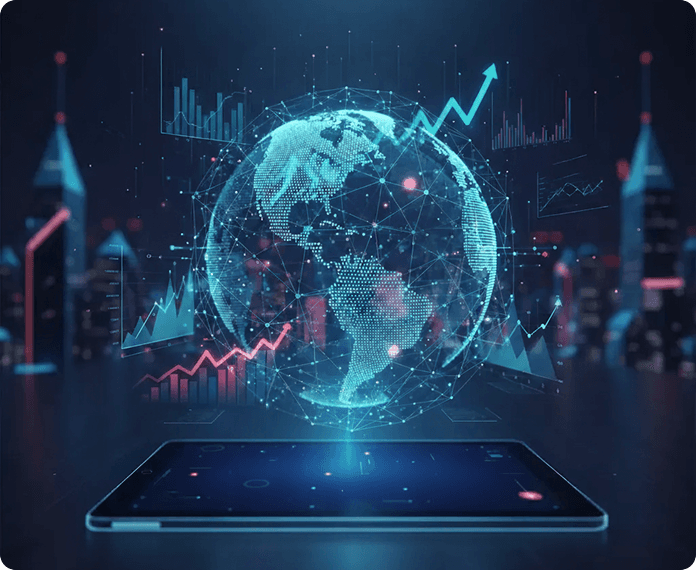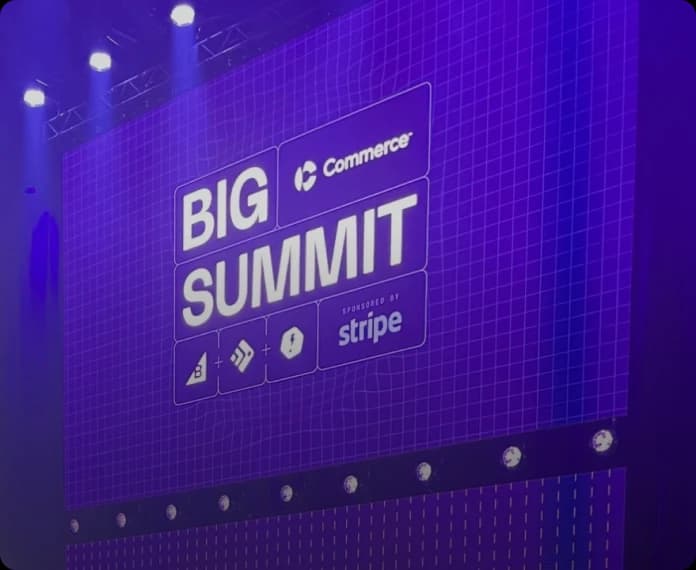Everything Starts (and Ends) with Data
I've spent enough time in Ecommerce to see technology platforms come and go - each one promising to be the missing piece. A new CMS, a new search engine, a new loyalty system, a new marketing cloud. Suites, piles of "Lego bricks", open-source, black box, "made by retailers for retailers", and so on.

And yet, after two decades of implementations, migrations, and integrations, I can tell you this with absolute certainty:
The real transformation never begins with the platform. It begins with the data.
Every single failing Ecommerce project I can recall tanked because someone somewhere did not think through the data modeling, schemas, ensuring there is a big picture for how data flows, how its governed, how its mined for insights. Every successful project had someone at the center of it who thought through the data pipes across the organization and had a strong authority in architecting a future solution.
Not the dashboards. Not the campaigns. The data itself - how it's owned, connected, understood, and activated.
Everything else is just plumbing.
The Mirage of "Digital Transformation"
Most companies that we interact with on all things digital believe they're transforming. They're replatforming. They're adopting a new ERP. They're integrating a shiny customer data platform or composable stack. When you meet them and run through pre-sales discovery, there is never a lack of ambition; and now, emboldened with ChatGPT-generated "unique requirements", many begin to truly believe that they are "transforming" their businesses.
But when you dig deeper, you find something else: the systems change, but the data stays fragmented. Customer records live in five different places. Product data is managed by three different departments. Why do we need a PIM? Can't ecommerce cart handle the products? Loyalty systems operate in a silo. Every app promises to make sense of it all, but none truly do. And SI agencies involved are happy to quote "migration" fees to implement a new shiny tool. Only a few of us challenge prospects with fundamental questions that may actually stop a replatforming project and convert it to a conceptual rethinking of how a client digital business should operate at its core.

The organization ends up owning technology - but also renting insights that are limited to only those available through out-of-the-box functionality of their new platform.
Transformation without data ownership is just motion, not progress.
Owning the Data Is the Only Sustainable Advantage
I've seen too many brands outsource their most valuable asset - their audience intelligence - to agencies, analytics vendors, or ad platforms. In other words, a shopper's interaction with your brand, all of his/her touch points with your organizations via the website, customer service calls, physical visits, social engagement, etc. Too many a time its just too easy to have someone on retainer bring you back those fancy PowerPoint decks explaining what your audience is doing.
That worked when the digital ecosystem was new. It doesn't work anymore. Today, customer data is your business.
When someone else manages your data, they don't just hold your reports - they hold your future decision-making power. Your vision into behaviors and signals of your audience is via the lens of that service provider, biased, subjective, and, unfortunately, often driven by maximizing their billable hours.

Owning data means more than having access to it. It means understanding its lineage, defining its structure, and controlling how it fuels every touchpoint - from ad spend to personalization to fulfillment. You wouldn't believe it, but a couple of years ago, one retailer bragged to me that they hold their ad agency accountable via the 'metrics'. And what metrics these may be? The number of impressions, no less! Being a B2B brand, they also wondered why the effectiveness of their ad campaigns dramatically fell during Saturdays and Sundays - and their agency then charged a hefty fee to conduct a 'research' culminating in a eureka statement that their business customers do not shop on weekends! Get that stuff back in house, stop bleeding cash and fire them charlatans, I told them, and they did.
The moment a brand takes back control of its data, something profound happens: clarity.
Suddenly, decisions are faster. Experiments are cheaper. Patterns emerge. The entire organization starts to operate with purpose, not guesswork.
The Experience Has Replaced the Product
The biggest myth in retail today is that customers are loyal. They're not. They're engaged - and this engagement is situational, not permanent. If you disagree with me, think of yourself as a shopper and think of your favorite brand. You don't want them to be in your face all the time, but you want them to be there when you do need them, i.e. context matters! And its getting the context right that wins your loyalty.
I can call myself a loyal United Airlines customer - raking in the miles I do on many airlines, but its United who deciphers my intent and is there for me when I need to get their help to accommodate my abrupt travel changes; I engage with their promotions and offers since they are very relevant to me, coming at the exact moment when I can use them. Help me fly where I want to - that's how they keep me loyal.

Loyalty is earned and re-earned through experience, not discounts. I do have to digress here and mention these idiotic "get 10% off for giving us your email" popups that open when you first enter a website; an instant trust killer, a merchandising idiocy at its best.
I've seen brands build massive "loyalty" databases - millions of email addresses, years of transaction history - and still fail to retain and understand customers. Why? Because loyalty points don't replace connection.
People remember how you made them feel. And data, if used right, is how you learn why.
It's what allows you to recognize patterns not just in purchases, but in context - when they buy, how they browse, what life event triggers a need.
That's not CRM data. That's friggin' behavioral empathy at scale.
The Human Side of Data
We often treat data as something mechanical, like numbers in motion, processed by systems. But the truth is, data is deeply human. It's the digital trace of emotion and behavior.
Every click, search, or browse pattern represents curiosity, frustration, excitement, hesitation. I love the term "rage clicks" - someone should come up with an "utter loss" equivalent of a frustrated shopper trying to find the right product on a website.
Data alone doesn't tell you anything unless you actually connect with humans.

Years ago, I was running off-road race championships in Ukraine. Picture mud, noise, diesel fumes, and people who could rebuild a transmission blindfolded, but maybe not type very fast. We built an online registration form for the race. Pretty simple, really: name, car, class, and one of those little CAPTCHA boxes to prove you're human. Ours was elegant. Just a quick math problem like "6 + 2" with "Enter the answer" next to it.
And then… silence. Barely anyone registered. The phone started ringing. "Your website's broken!" "It won't take my entry!" I thought, impossible. It's basic math! Until the day after, when a delegation of very angry (and very drunk) racers showed up to demonstrate "how your damn form doesn't work." They sat down, stared at the screen, saw the CAPTCHA "2 + 2", and proudly typed… "2 + 2".
That's when I realized: data validation is easy. Human validation? Not so much.
Our job as practitioners, strategists, and technologists is to listen to those signals and respond in a way that respects intent and human understanding.

That's why I always tell my team: being "data-driven" is not the same as being "human-blind." If the algorithms make the experience colder or miss context, we failed.
The right use of data creates intimacy, not intrusion.
The Myth of One-to-One Personalization
There's another fallacy that refuses to die: the dream of "true one-to-one personalization."
Marketers talk about it like it's the holy grail. In reality, it's a budgetary nightmare. It's not scalable, and it's not even necessary.
What matters is micro-segmentation: finding the meaningful clusters where relevance actually increases conversion.

That's where data earns its value. Not in predicting every move, but in guiding creativity efficiently. You don't need to know everything about everyone. You just need to know enough to speak to the right people at the right time with the right tone.
Precision isn't the goal but clarity is.
Integration Is the Real Innovation
In most tech stacks, the magic isn't in the tools; rather it's in the lines that connect them.
APIs, webhooks, data pipes is where the competitive edge lies.

Aren't you sick and tired of every platform today claiming to be "AI-ready," "composable," or "open." I mean who hasn't put up their MCP server up and declared themselves to be Agentic AI - ready? But the true test of maturity is whether your systems share a single view of the customer, or whether they keep forcing you to reconcile duplicates every week.
I see a very clear pattern: the brands that win are those that treat data integration as a first-class product, not a back-office task.
When product, customer, and behavioral data flow together, every system in your stack becomes smarter and your team becomes more creative, not more burdened.
From Correlation to Causality
One of the hardest questions in commerce is: what actually caused the sale?
Was it the ad impression? The abandoned cart email? The influencer video? The timing of a pay cycle?

Most analytics answer in correlation, i.e. "people who did X were likely to do Y." But real progress happens when you start looking for causality, or the behaviors that trigger action.
That's where data science and storytelling meet. You start discovering that behavior change is rarely linear. A specific product view might not drive a purchase, but it might signal a change in intention that matters more in the long run.
That's what we try to help our clients uncover at Mira: the why behind the what.
Automate Intelligently, Not Blindly
We've all heard the mantra: "Do more with less." But automation for its own sake doesn't scale; it just accelerates confusion.
The right automation amplifies intelligence, not replaces it.
Dynamic creative optimization, predictive merchandising, AI-driven search are powerful, but only if they're grounded in clean, connected, owned data. By the way:
"A common mistake is to simplify and optimize a part or a process that should not exist." -- Elon Musk
Otherwise, you're just teaching machines to repeat your bad habits faster. You are programming inefficiencies back into the new systems.
Loyalty Rebuilt Through Relevance
Every retailer talks about loyalty programs, but most of these are really just discount engines.
If your loyalty system doesn't make the customer feel known, it's just an arithmetic, not loyalty.
Real loyalty comes from relevance, or understanding someone's context and anticipating their needs. Maybe it's offering the right message when they're planning a trip. Maybe it's surfacing the right recommendation when a life moment changes.
The point is, data gives you the permission to be useful.
Loyalty isn't earned through transactions. It's earned through timing, empathy, and understanding.
The Real Shift: Data Is Not a Byproduct: It's the Product
We often think of data as something we collect after the fact as an artifact or byproduct of our business. But the truth is, data is the business.
It's the most valuable product you and I create every day. Every transaction, every click, every search builds an intelligence engine unique to your brand.

When you start treating data as a product, i.e. one that deserves governance, stewardship, and design, your organization begins to evolve. I have seen this many a time now with many of my forward-thinking client practical operators. Once the "data is everything" clicks in their head, its only a matter of months before their sales numbers go up.
That's when systems stop competing and start cooperating. That's when decisions stop being political and start being factual.
That's when commerce becomes intelligent.
My Core Belief
At Mira Commerce, we build technology for ecommerce merchants, but what we really build are data ecosystems. What is an online shopping cart if not an extension of your ERP that is just one of many data collection points so that you can know your audience better?

No platform alone can make you customer-centric. Only data ownership and connected understanding can. That is an absolute that is not going away - no matter how much AI buzz is out there now, and no matter how many fancy labels platform marketers can come up with.
Data is not the exhaust of your business. It's the fuel. It's not what happens after the sale. It's what enables every sale!!!
Everything else - platforms, vendors, AI models are just tools. The data is the foundation.
The brand that knows its data best will always know its customers best. And the brand that knows its customers best always wins.
Thank you for reading this article, and I hope you found it valuable. Please, like and share - and also follow me to get insights and opinions on all things Ecommerce.
Never Stop!



.webp&w=3840&q=75)







